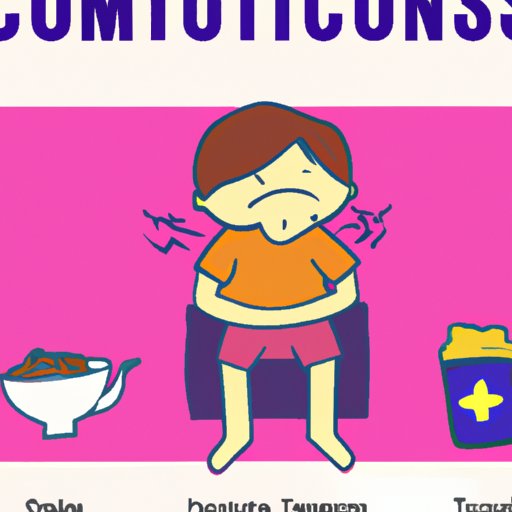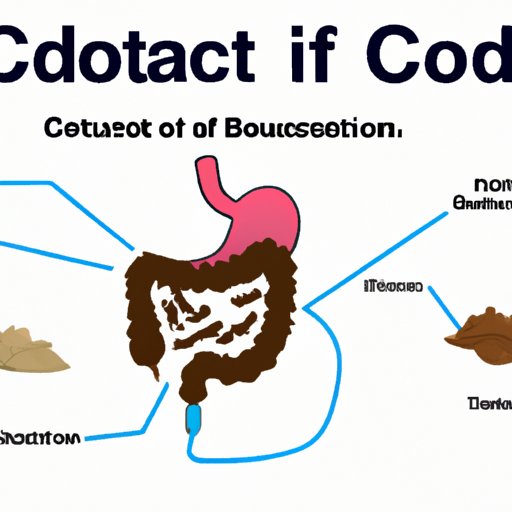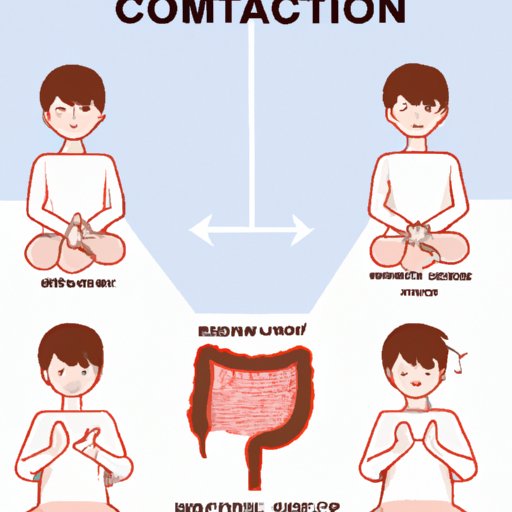Introduction
Constipation is a common problem that affects millions of people worldwide. It is characterized by infrequent bowel movements, difficulty passing stools, and abdominal discomfort. Constipation can be caused by a variety of medical conditions, medications, lifestyle habits, and dietary choices. Understanding the causes and symptoms of constipation can help individuals find relief from this uncomfortable condition.

Exploring the Causes and Symptoms of Constipation
There are several medical conditions that can lead to constipation. These include irritable bowel syndrome, inflammatory bowel disease, celiac disease, endocrine disorders, and neurological disorders. Some medications, such as opioids, antacids, and antidepressants, can also cause constipation. In addition, changes in diet or lifestyle habits, such as not getting enough exercise or drinking enough water, can contribute to constipation.
The symptoms of constipation vary from person to person but typically include infrequent or difficult bowel movements, abdominal pain or cramping, bloating, nausea, and feeling full quickly after eating. Individuals with constipation may also have an urge to defecate without producing any stool.

Understanding the Digestive Process and How it Relates to Constipation
In order to understand how constipation works, it is important to first understand the normal digestive process. After food is consumed, it is broken down in the stomach and small intestine. The nutrients from the food are absorbed through the walls of the small intestine into the bloodstream. The waste materials that remain travel to the large intestine, where water is removed and the remaining material is formed into stool. Finally, the stool is passed through the rectum and out of the body.
When the digestive process is impaired, constipation can occur. This can happen when the muscles of the intestines become weak or slow, when the amount of water in the stool is too high, or when the nerves that control the intestines do not work properly. Additionally, if the diet does not include enough fiber, the stool will be dry and hard, making it difficult to pass.
Investigating Treatments for Constipation
The treatment for constipation depends on the underlying cause. Over-the-counter medications, such as laxatives, stool softeners, and fiber supplements, can be used to help ease constipation. Prescription medications, such as lubiprostone or linaclotide, may be necessary for more severe cases. Home remedies, such as drinking plenty of fluids, eating more fiber-rich foods, and exercising regularly, can also help relieve constipation.
Examining the Role of Diet in Constipation
Diet plays an important role in preventing and treating constipation. Foods that should be avoided include dairy products, processed foods, and foods high in sugar and fat. Instead, individuals should focus on eating more fiber-rich foods, such as fruits, vegetables, and whole grains. Drinking plenty of fluids, such as water and herbal teas, can also help keep the digestive system functioning properly.

Analyzing Common Misconceptions About Constipation
There are many misconceptions about constipation that can lead to confusion and frustration. One of the most common myths is that constipation is always a sign of poor health. While it is true that certain medical conditions can cause constipation, it is not always the case. Additionally, some people believe that eating fibrous foods will cure constipation. While it is true that fiber-rich foods can help prevent constipation, they are not a cure-all.
Conclusion
Constipation is a common problem that can be caused by a variety of factors, including medical conditions, medications, lifestyle habits, and dietary choices. Treatment typically involves over-the-counter medications, prescription medications, home remedies, and dietary changes. It is important to seek professional help if the condition persists or worsens. By understanding the causes and symptoms of constipation, individuals can find relief from this uncomfortable condition.
(Note: Is this article not meeting your expectations? Do you have knowledge or insights to share? Unlock new opportunities and expand your reach by joining our authors team. Click Registration to join us and share your expertise with our readers.)
